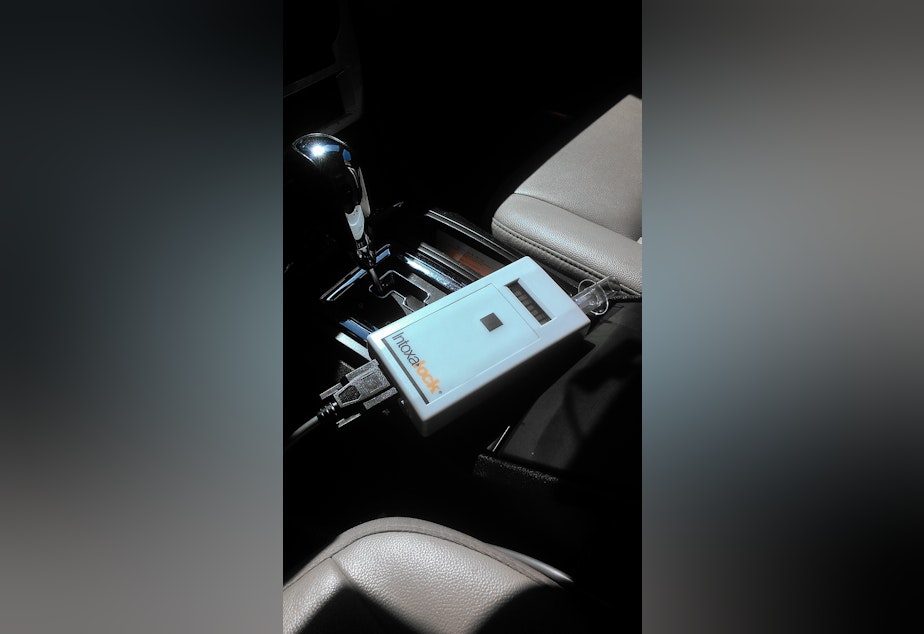DUI Monitoring And Enforcement: An Imperfect System

Washington state lawmakers are poised to impose tougher laws against drivers caught driving drunk. They were moved to action following two fatal crashes involving drivers with previous DUIs.
The current system that deals with DUIs is complicated and expensive and only effective if people comply with the law.
According to the Washington Department of Licensing, nearly 44,000 state residents are required to install an ignition interlock on their vehicle if they want to drive.
The device will prevent a vehicle from starting if the driver's breath alcohol content is more than .04. The legal limit is .08.
Michael was charged with a DUI two years ago. He agreed to be interviewed if we would only use his middle name. Michael says he’s not an alcoholic.
Sponsored
He made a mistake, he says, but it was an extremely costly mistake.
Complying with court requirements can cost offenders between $300 and $1,400 a month depending on the sentence and level of monitoring.
Michael uses an ignition interlock on his car, but since his conviction, he says, he rarely drinks even when he isn’t driving.
“Because of what I’ve experienced, and the seriousness of it and how difficult it’s been to get out of it, it had an impact on me, for sure,” he says.
Michael complied with all of his court requirements.
Sponsored
But some offenders don’t comply with the law. According to the Washington state Department of Licensing, only slightly more than half of the drivers who are required to have the ignition interlock device have it installed. Those people are not legally able to drive, but many still do — like Mark Mullan.
Mullan had previously been arrested five times for driving under the influence. He’s now facing vehicular homicide charges in the deaths of two people. Two others were also critically injured in the accident.
Patricia Fulton is a defense attorney in Seattle. About half of her cases are DUIs.
She says counties and small cities with strapped budgets simply don’t have the ability to perfectly monitor the 38,000 DUI offenders who are arrested each year in Washington state. And the stakes are high for public safety and public tax dollars.
“If they don’t supervise someone carefully, then that person goes out and commits a horrible crime," Fulton says. "Then there’s a death, and then the city or the county gets sued because they weren’t noticing that this person was spiraling out of control."
Sponsored
Enforcement and monitoring of DUI offenders is tricky in part because there are so many agencies are involved in the process. The courts, the Department of Licensing and the Department of Social and Health Services each has a role.
The system is expensive and imperfect.
In Michael’s DUI, a judge closed his case, but he says his drug and alcohol assessment provider never sent the required paperwork into the Department of Licensing.
As a result his license was re-suspended twice. He says he found out by accident.
He hadn’t known about the paperwork mistake. “If I were to get caught driving without a license, my car could have been impounded," he says. "I could have been thrown in jail; I would have lost my job all because somebody made a clerical error.”
Sponsored
It was an error that only would have affected him. But it’s the kind of mistake that happens when there are so many moving parts.
New laws being considered in the Legislature would increase jail time for repeat drunk offenders and shorten the gap of time an offender has to put an ignition interlock on their car.
Attorney Patricia Fulton says increasing jail time is a popular idea but it’s not the most effective. “We don’t see research telling us the more jail you impose on a DUI conviction, the less likely this person is to reoffend." she says. "So unless we are better able to address the underlying issues of substance abuse and addiction, we’re going to be continually at risk.”
Share your ideas and help Patricia Murphy report this story
Where the fewest DUI drivers comply with an order to install an interlock device:
Sponsored
Map credit: Carolyn Adolph.

